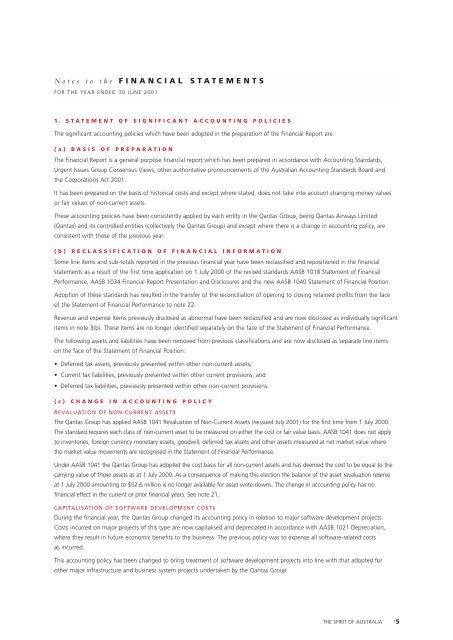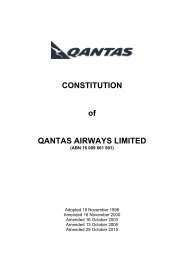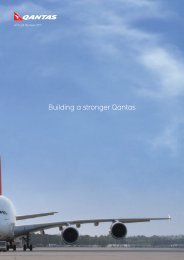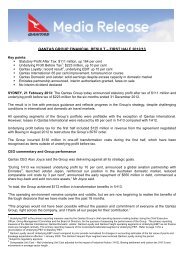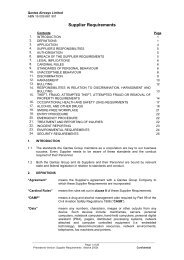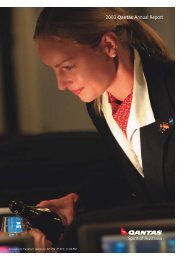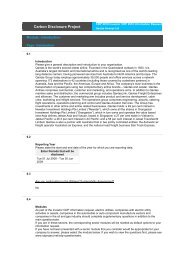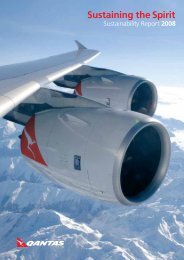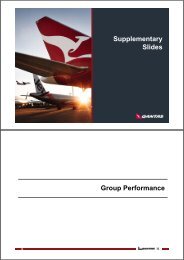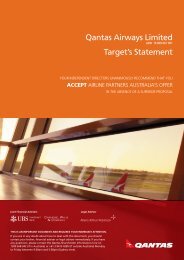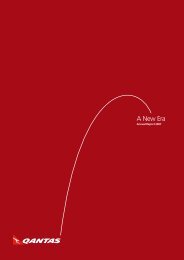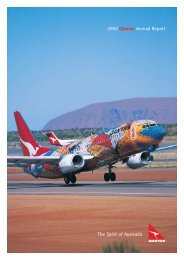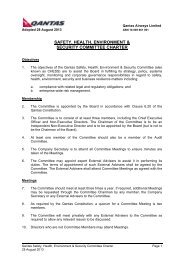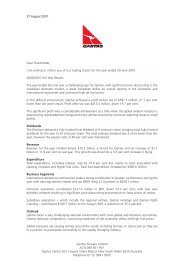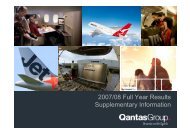2001 Qantas Financial Report
2001 Qantas Financial Report
2001 Qantas Financial Report
Create successful ePaper yourself
Turn your PDF publications into a flip-book with our unique Google optimized e-Paper software.
Notes to the FINANCIAL STATEMENTS<br />
FOR THE YEAR ENDED 30 JUNE <strong>2001</strong><br />
1. STATEMENT OF SIGNIFICANT ACCOUNTING POLICIES<br />
The significant accounting policies which have been adopted in the preparation of the <strong>Financial</strong> <strong>Report</strong> are:<br />
(a) BASIS OF PREPARATION<br />
The <strong>Financial</strong> <strong>Report</strong> is a general purpose financial report which has been prepared in accordance with Accounting Standards,<br />
Urgent Issues Group Consensus Views, other authoritative pronouncements of the Australian Accounting Standards Board and<br />
the Corporations Act <strong>2001</strong>.<br />
It has been prepared on the basis of historical costs and except where stated, does not take into account changing money values<br />
or fair values of non-current assets.<br />
These accounting policies have been consistently applied by each entity in the <strong>Qantas</strong> Group, being <strong>Qantas</strong> Airways Limited<br />
(<strong>Qantas</strong>) and its controlled entities (collectively the <strong>Qantas</strong> Group) and except where there is a change in accounting policy, are<br />
consistent with those of the previous year.<br />
(b) RECLASSIFICATION OF FINANCIAL INFORMATION<br />
Some line items and sub-totals reported in the previous financial year have been reclassified and repositioned in the financial<br />
statements as a result of the first time application on 1 July 2000 of the revised standards AASB 1018 Statement of <strong>Financial</strong><br />
Performance, AASB 1034 <strong>Financial</strong> <strong>Report</strong> Presentation and Disclosures and the new AASB 1040 Statement of <strong>Financial</strong> Position.<br />
Adoption of these standards has resulted in the transfer of the reconciliation of opening to closing retained profits from the face<br />
of the Statement of <strong>Financial</strong> Performance to note 22.<br />
Revenue and expense items previously disclosed as abnormal have been reclassified and are now disclosed as individually significant<br />
items in note 3(b). These items are no longer identified separately on the face of the Statement of <strong>Financial</strong> Performance.<br />
The following assets and liabilities have been removed from previous classifications and are now disclosed as separate line items<br />
on the face of the Statement of <strong>Financial</strong> Position:<br />
• Deferred tax assets, previously presented within other non-current assets;<br />
• Current tax liabilities, previously presented within other current provisions; and<br />
• Deferred tax liabilities, previously presented within other non-current provisions.<br />
(c)<br />
CHANGE IN ACCOUNTING POLICY<br />
REVALUATION OF NON-CURRENT ASSETS<br />
The <strong>Qantas</strong> Group has applied AASB 1041 Revaluation of Non-Current Assets (reissued July <strong>2001</strong>) for the first time from 1 July 2000.<br />
The standard requires each class of non-current asset to be measured on either the cost or fair value basis. AASB 1041 does not apply<br />
to inventories, foreign currency monetary assets, goodwill, deferred tax assets and other assets measured at net market value where<br />
the market value movements are recognised in the Statement of <strong>Financial</strong> Performance.<br />
Under AASB 1041 the <strong>Qantas</strong> Group has adopted the cost basis for all non-current assets and has deemed the cost to be equal to the<br />
carrying value of those assets as at 1 July 2000. As a consequence of making this election the balance of the asset revaluation reserve<br />
at 1 July 2000 amounting to $52.6 million is no longer available for asset write-downs. The change in accounting policy has no<br />
financial effect in the current or prior financial years. See note 21.<br />
CAPITALISATION OF SOFTWARE DEVELOPMENT COSTS<br />
During the financial year, the <strong>Qantas</strong> Group changed its accounting policy in relation to major software development projects.<br />
Costs incurred on major projects of this type are now capitalised and depreciated in accordance with AASB 1021 Depreciation,<br />
where they result in future economic benefits to the business. The previous policy was to expense all software-related costs<br />
as incurred.<br />
This accounting policy has been changed to bring treatment of software development projects into line with that adopted for<br />
other major infrastructure and business system projects undertaken by the <strong>Qantas</strong> Group.<br />
THE SPIRIT OF AUSTRALIA<br />
p<br />
5


